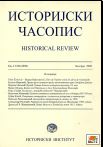Сведочење у судском доказном поступку према млађим рукописима законодавства цара Стефана Душана
Court Testimony in the Legislation of Tsar Dushan According to the Manuscripts of the More Recent Redaction
Author(s): Biljana MarkovićSubject(s): History
Published by: Istorijski institut, Beograd
Keywords: The Matthew Blastares; Justinian’s Law; Dushan’s Code; witness; law; court
Summary/Abstract: In the manuscripts of the more recent redaction in the legislation of Tsar Stephan Dushan (mostly dating from the 17 th and 18 th century) regulations concerning court testimony in legal presentation of evidence are contained in Justinian’s Law. In Dushan’s Code there is only one regulation regarding court testimony (article 80), similar to the manuscripts of the more ancient redaction. In the article 80 one legal provision concerns the process of determining witnesses in the litigation among villages regarding village boundaries. The regulations contained in the Justinian’s Law of the more recent redaction were mostly taken from Justinian’s Law of the most ancient redaction and from the Abridged Syntagm of Matthew Blastares, sometimes with smaller and sometimes with more significant changes and sometimes also without any changes at all. However, many regulations from the manuscripts of the more ancient redaction were not taken, probably because they were considered to be outdated or unnecessary. In Justinian’s law it is determined who could be a witness and who couldn’t, along with the obligation of taking a solemn oath before the testimony and the manner in which that oath should be taken. A certain number of witnesses necessary for different legal situations is determined. The punishments for false testimony are regulated also. Some regulations are clear and detailed and some are in collision with one another which demonstrates us the confusion of the redactor/scribe and the misunderstanding in regard to the social conditions dating from the time of earlier legal codes and the rules that regulated the social relations. Some terms have become distant and some totally unfamiliar to the redactor. There was an intention to use earlier legal texts to compose the new law corpus useful to Serbian communities. Exclusion and adaptation of some norms has damaged the overall structure of the text, the accuracy of the order of articles and the relations between them. Composing legal norms in an entirely new order, avoiding collisions between them and adapting them to modern social circumstances were very complex tasks. So, in the assessment made at the omissions and the inconsistencies, we must remindourselves that a number of valuable information regarding the Serbian communities living in the time of difficult historical circumstances has arrived to us through the preserved manuscripts of the more recent redaction. These circumstances preceded the formation of new independent Serbian state in the 19th century.
Journal: Историјски часопис
- Issue Year: 2013
- Issue No: 62
- Page Range: 139-159
- Page Count: 21
- Language: Serbian

